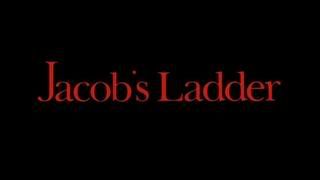
PLOT:
Jacob Singer (Tim Robbins), a Vietnam veteran, begins to have strange demonic visions that seem connected to his experiences during the war. Discovering that the surviving members of his platoon are experiencing similar dreams, Jacob begins to believe that his unit were the subject of tests by the American military. As the walls of his reality break down, and his hallucinations become more frequent, Jacob begins to uncover what seems like a massive conspiracy. Haunted by visions of death, including that of his young son, what is fantasy and what is delusion soon become difficult to discern.
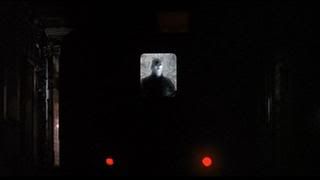
REVIEW:
Director Adrian Lyne is best known for erotic thrillers like Fatal Attraction, but with Jacob's Ladder he proves to have some serious chops when it comes to psycho-horror. Hanging off an amazing performance by Tim Robbins, the film creates some wonderful tension with its dream within a dream state, and has a memorable shock ending that still remains a bit shocking even after the audience has been bombarded with decades of of M. Night Shyamalan twists.
Admittedly, some of the fun of the film comes from picking out the many actors in the cast who went on to some degree of fame. Ving Rhames (Pulp Fiction), Eriq La Salle (E.R.), Jason Alexander (Seinfeld), Macaulay Culkin (Home Alone), and even blink-and-you'll-miss-'em appearances by Lewis Black (The Daily Show) and Kyle Gass (Tenacious D!). However, at times this is a relentlessly bleak film with some rather disturbing imagery in the Cronenberg vein. It's often only Robbins' boyish charm, along with a winning supporting performance from Danny Aiello as Louis, Robbins' chiropractor, that add a little light to the subject matter.
In the most telling dialogue in the film, Louis (Aiello) tells Jacob (referring to Meister Eckhart):
Eckhart saw Hell too. He said: The only thing that burns in Hell is the part of you that won't let go of life, your memories, your attachments. They burn them all away. But they're not punishing you, he said. They're freeing your soul. So, if you're frightened of dying and... and you're holding on, you'll see devils tearing your life away. But if you've made your peace, then the devils are really angels, freeing you from the earth.
This surprising bit of enlightenment informs the second half of the film greatly, and is a hint at Jacob's final fate.
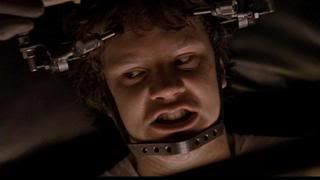
Robbins plays Jacob as a disturbed, but very sympathetic character unable to deal with his reality slowing melting away. It's a charged performance, particularly in the scene (burned into my young consciousness) where he's wheeled into an operating room, tied to what appears to be some awful piece of medical equipment, and told that he's dead before they start operating on him. In the commentary, Lyne says that Robbins' acting in this scene made himself and his cameramen weep, and it remains a very disturbing, powerful scene.
The supporting cast is fine, with Elizabeth Peña giving a strong performance as Jezzie (short for Jezebel), Jacob's girlfriend. She has to strike the right note of sympathy, while maintaining moments of anger and frustration with Jacob's state, and her character has a strange sexiness even as her demonic tendencies are hinted at. Jason Alexander has a nice turn as a ice-chewing, frustrated lawyer, and Eriq La Salle gets a few nice character moments late in the film.
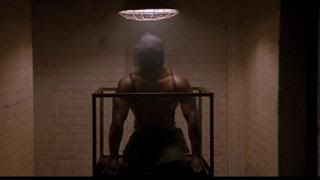
The bad trip imagery can be effective, but sometimes (like in the appearance of tentacles in the subway scene) come off as a little hokey. The jumping around in time (and, apparently, reality) can be a bit difficult to take as well, sometimes coming off like an average Twilight Zone episode rather than a fully fleshed out film, but things tighten up in the final act. The religious imagery (particularly in the naming of the characters) can be a little obvious, but Lyne seems very comfortable with his pretensions and is deftly able to deliver the psychological goods.
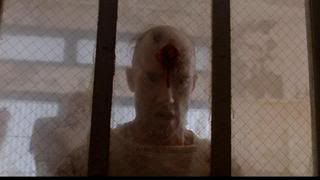
The Special Edition DVD was originally released in 1998, and while the film is shown in it's original 1.85:1 format, the print is very grainy looking. Still, for a film that originally bombed, some care has been taken with the supplementary materials.
First, we have a commentary with director Adrian Lyne. It's screen specific, and often quite interesting, but there are long gaps (particularly near the end) that slow the whole thing to a crawl. Lyne is obviously quite fond of the film, and his memories of the production are sporadic but very entertaining.
Unfortunately, most of the interesting information is repeated in the half hour Building Jacob's Ladder featurette which also features talking head interviews with writer Bruce Joel Rubin (writer of Jacob's Ladder and Ghost) as we as some small interview snippets with Tim Robbins, Elizabeth Peña and Danny Aiello. Rubin seems appreciative of the changes which Lyne brought to his script, but is critical of the removal of a scene with Peña late in the film. The behind the scenes footage, particularly of the terrifying decent into hell, is quite interesting.
We are also treated to three rather significant deleted scenes with optional director's commentary. All come near the end of the film, though it's the Peña scene which is most significant. Its inclusion would have made the film a bit easier to interpret, but I don't think the film feels like it's missing the scene. The other two would have made the transition to the ending less abrupt, but would have slowed the pace at a critical time.
A theatrical trailer, television spot, cast & crew information and production notes round off the package.
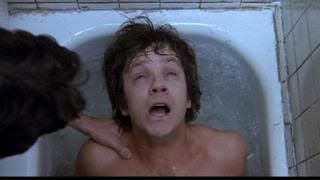
Looking back, Jacob's Ladder seems to have had more influence on popular culture than one might think. While the director was going over territory mined by directors like David Cronenberg and David Lynch, this Vietnam variation on An Occurrence at Owl Creek Bridge remains slightly more palatable while still featuring some shocking and disturbing imagery. A terrific psychological horror film featuring one of Tim Robbin's most impressive performances.










2 comments:
I remember having the most amazing crush on Elizabeth Peña when this movie started.
Maybe it was the short hair but I thought she was totally hot.
Then came the scene in the movie where she turned into a gargoyle. Holy shit..
The thrill was gone..
Admittedly, the fact that she's undressed for a good deal of the movie certainly might have had some influence on that crush. :)
She does a really god job in a tough role, though. I also remember thinking she was great in John Sayles' LONE STAR.
Post a Comment